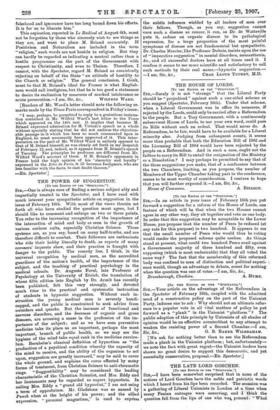THE POWER OF SUGGESTION.
[To THY EDITOR or rne .8recreroe."1 Sin,—One is always sure of finding a serious subject ably and impartially treated in the Spectator, and I have read with much interest your sympathetic article on suggestion in the issue of February 16th. With most of the views therein set forth all who have studied the question must agree, but I should like to comment and enlarge on two or three points. You refer to the increasing recognition of the importance of the interaction of mind and body as seen in the growth of various curious cults, especially Christian Science. These systems are, as you say, based on many half-truths, and are therefore difficult to combat. Their followers are enthusiasts who ride their bobby literally to death, as reports of many coroners' inquests show, and their practice is fraught with danger to the public. The remedy lies, I think, in the universal recognition by medical men, as the accredited guardians of the nation's health, of the importance of the subject, and the teaching of practical psychology in the medical schools. Dr. Auguste Forel, late Professor of Psychology at the University of Zurich, the translation of whose fifth edition into English by Dr. Armit has recently been published, felt this very strongly, and devoted much time to the practical and systematic instruction of students in hypnotic suggestion. Without such in- struction the young medical man is severely handi- capped, and the public is constrained to seek advice from outsiders and quacks. But the increase of functional and nervous disorders, and the decrease of organic and gross diseases, are arousing a sense in the profession of the im- portance of the subject ; and as we have seen preventive medicine take its place as an important, perhaps the most important, branch of public health, so we may see the hygiene of the mind take equal rank in the medicine curricu- lum. Bernheim's classical definition of hypnotism as "the' production of a psychical condition whereby the capacity of the mind to receive, and the ability of the organism to act upon, suggestion are greatly increased," may be said to cover the whole ground, and explains the cures effected by many forms of treatment, from Christian Science to anti-rheumatic rings. " Suggestibility " may be considered the leading characteristic• of the Christian Scientist, and Mrs. Eddy and her lieutenants may be regarded as expert hypnotists. In calling Mrs. Eddy a "grand old hypnotist," I am not using a term of opprobrium. Mr. Gladstone was so named by Punch when at the height of his power; and the allled expression, " personal magnetism, is used to expsiess the subtle influence wielded by all leaders of men over their fellows. Though, as you say, suggestion cannot cure such a disease as cancer, it can, as Dr. de Watteville puts it, reduce an organic disease to its pathological expression, for a large proportion of the most painful symptoms of disease are not fundamental but sympathetic. Dr. Charles Mercier, like Professor Dubois, insists upon the use of "imperative suggestion" in mental disorders, neurasthenia, &c., and all successful doctors have at all times used it. I confess it seems to me more scientific and satisfactory to. call such methods by their real name,—hypnotic suggestion.-










































 Previous page
Previous page